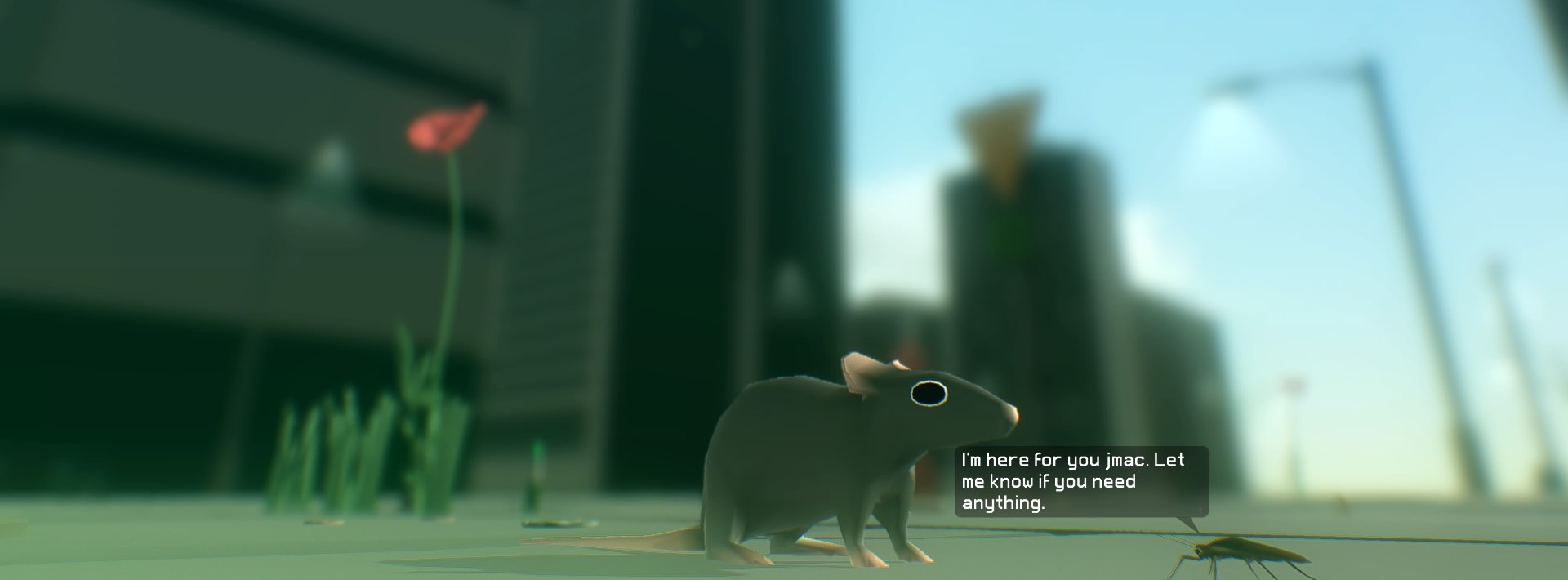You have just read a blog post written by Jason McIntosh.
If you wish, you can visit the rest of the blog, or subscribe to it via RSS. You can also find Jason on Twitter, or send him an email.
Thank you kindly for your time and attention today.
 I played quite a lot of David O’Reilly’s Everything in early 2017, shortly after its publication, on the recommendation of a dear friend with a wider philosophical exposure than me. It served as my introduction to Alan Watts’s lectures—a body of work whose written underpinnings I have only very recently started to explore, to my great pleasure. I suspect I find these books all the more meaningful due to concepts this strange video game exposed me to, however oblique I found them at the time.
I played quite a lot of David O’Reilly’s Everything in early 2017, shortly after its publication, on the recommendation of a dear friend with a wider philosophical exposure than me. It served as my introduction to Alan Watts’s lectures—a body of work whose written underpinnings I have only very recently started to explore, to my great pleasure. I suspect I find these books all the more meaningful due to concepts this strange video game exposed me to, however oblique I found them at the time.
During the weeks I played it intensively, I enjoyed Everything at its surface level, one that I’d recommend most anyone. The game presents a self-paced scavenger hunt that challenges you in the gentlest terms to tag every object, creature, sub-atomic particle and cosmic superstructure that defines its multi-layered universe. You tag things by embodying them: generally, if you can see a discrete object, you can shift your focus to it and then control it for a time: a rolling pebble, a tumbling ibex, an oscillating superstring. You can zoom in or out of the observed scale, summon objects you’ve inhabited before, “sing” and “dance”, and perform other curious actions.
The universe of Everything talks back to you, too. The objects, creatures, and entities you come across sometimes display icons indicating its “thoughts”. On request, these might resolve into small textual koans, aphorisms, or non-sequiturs—or they might cue up a minute or two of an Alan Watts lecture, just long enough to express a single point. The latter happens with no especial setup or context, and the snippets arrive in an apparently random (but, I am told, subtly sequential) order. The universe of Everything simply hums in resonance with Watts’s voice, and playing the game attentively means bathing in that voice as well.
These lectures, presenting an intentionally jumbled-order gloss of certain Hindu and Zen Buddhist philosophies (and tailored for a mid-century Western audience) entertained and intrigued me enough that I sought and easily found more in the form of the Alan Watts podcast, whose short episodes slice up Watts’s speech almost as finely as the video game does. I remain a subscriber, and so still receive these pleasant and mildly illuminating audio dispatches on the regular. But it took until this month for me to try reading (or listening to) entire, linear books by Watts. Perhaps I made myself more receptive to their message through years of exposure to lecture-clips, but in any event the longer works have rolled me into a new appreciation for the greater point Everything tries to make, and its invitation that the player reflect this point into the real world.
I suddenly understand, for example, that the game’s geometric icon depicts an abstracted Indra’s net, a visual metaphor for not just the interconnectedness but the infinitely recursive mutual reflectiveness of all things. Three years after the fact, I have a much greater appreciation for the resolution of Everything’s story mode, which shows you how to collect all the “thoughts” you encounter, arranging them into a catalogue of contemplation—and then traps you in a sort of limbo-world until you deliberately erase them all. And I understand the game’s above-all mantra of “You are…” (“You are an arctic fox”, “You are a spiral galaxy”), displayed every time you shift focus. It represents the universal and divine Self, the One that is Everything, and the concept that Watts seemed the most eager to express in his lectures.
So far—and based entirely on availability via my library cards—I have listened to an audiobook of 1961’s Psychotherapy East and West, and read 2000’s What is Zen? The former speaks from its time, a culture just beginning to embrace therapy as a thing that “normal” people might wish to engage in, and so examines Buddhist practice through that lens. The thin and approachable latter book, published 27 years ater Watts’s death, was put together by his son Mark (and I get the impression that many books with Watts’s name on the cover fit this description). Just like the game and the podcast, it compiles edited bits of Watts’s lectures, but I very much valued their arrangement into printed, smoothly flowing chapters instead of bite-sized audio clips.
I won’t attempt any detail here about how this deeper reading has affected my life, in how it’s adjusted my knowledge of active meditation or personal identity. This delayed revelation about a weird video game, the second shoe whose dropping took me nearly four years to hear, leaves me with some processing to do! Right now, I feel it enough to appreciate the insights primed by the game and catalyzed by the books, all of which point to a way to look at the world and one’s place in it as novel and relevant to my culture today as it was 60 years ago.
This article was also posted to the “games” section of Indieweb.xyz.
To share a response that links to this page from somewhere else on the web, paste its URL here.